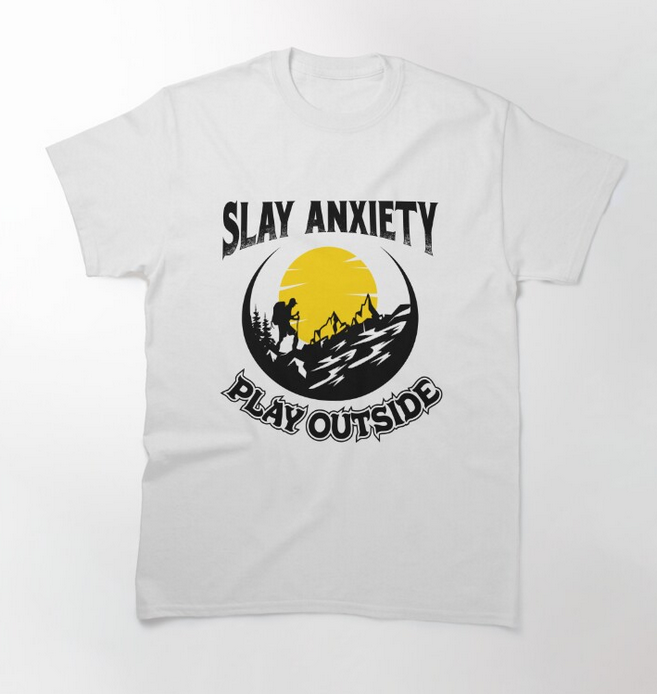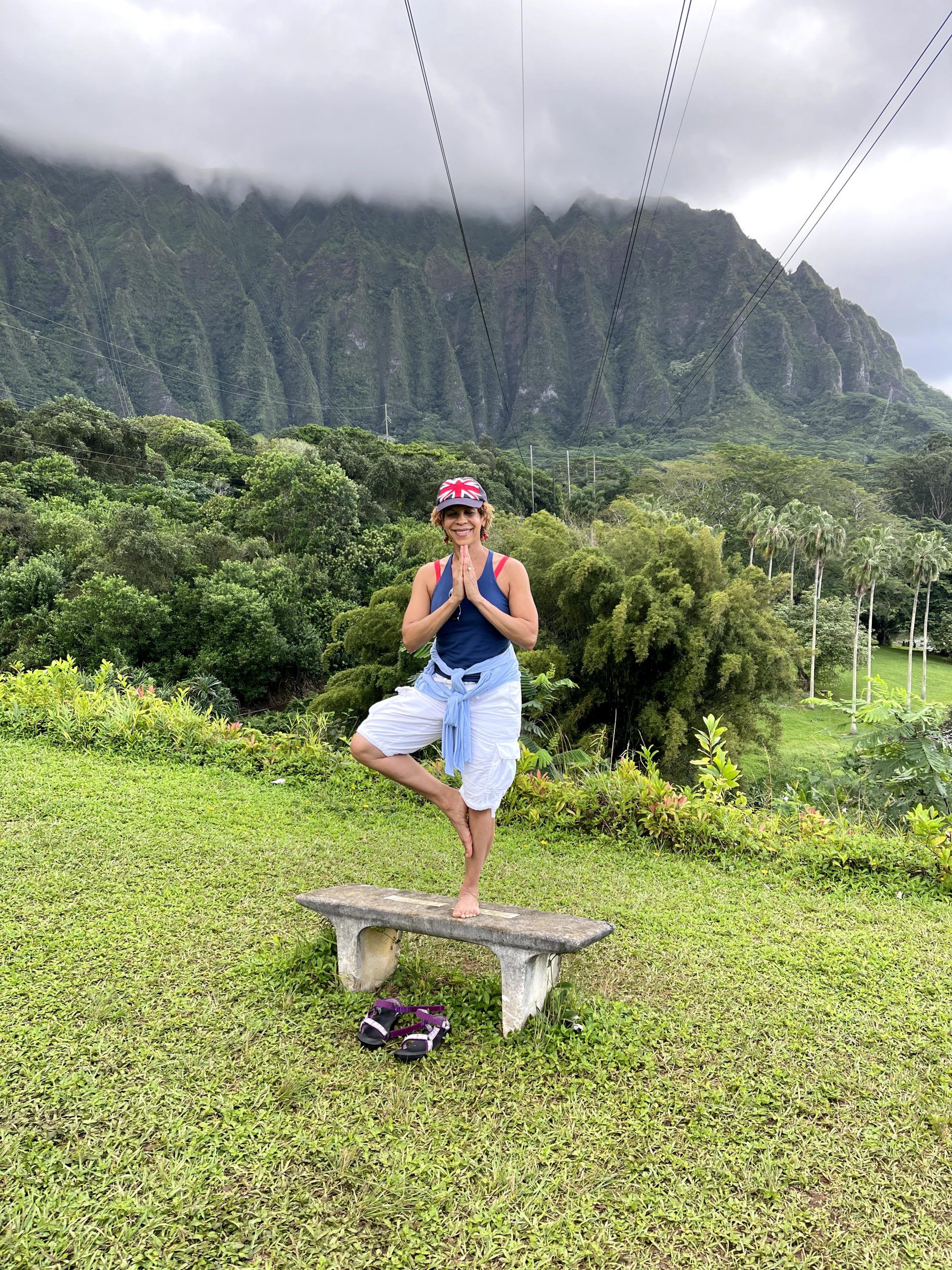Ecotherapy
Dwan Milam-Reed, PhD, LCSW-S, LICSW
346-236-7271
drdwanreed@gmail.com

Slay Anxiety Classic T-Shirt
- The standard, traditional t-shirt for everyday wear
- Classic, generous, boxy fit
- Male model shown is 6’0″ / 183 cm tall and wearing size Medium
- Female model shown is 5’8″ / 173 cm tall and wearing size Small
- Heavyweight 5.3 oz / 180 gsm fabric, solid colors are 100% preshrunk cotton, heather grey is 90% cotton/10% polyester, denim heather is 50% cotton/ 50% polyester
- Double-needle hems and neck band for durability

Ecotherapy
According to the National Institute of Mental Health, nearly one in five US adults is living with a mental illness (52.9 million in 2020), making it more common than most people think. Since mental health conditions are also on the rise, finding ways to manage the conditions has become essential.
One of the top forms of therapy gaining popularity for its effectiveness is ecotherapy. Also known as green exercise or care, ecotherapy is a treatment that involves being active in natural spaces. While the definition might vary, it’s typically a structured activity led by a therapist, focuses on the activity instead of the health outcome, and takes place in a natural setting.
This post looks at all you need to know about ecotherapy, including its benefits and effectiveness.
What Is Ecotherapy
Ecotherapy, also known as nature therapy, is a formal type of therapeutic treatment which involves performing psychotherapeutic activities (social work, psychotherapy, counselling, prevention, self-help), undertaken with an ecological consciousness or intent, often utilizing natural settings, activities or processes as an integral part of the therapeutic process.
Ecotherapy focuses on the ecological aspects of self, identity and behaviour by connecting an individual with nature through different programmes that foster healing and growth. Nature-assisted therapy can be performed as a stand-alone therapy or with other common types of mental health therapy.
Not everyone who participates in ecotherapy has a mental health condition. Anyone can enjoy the benefits of ecotherapy regardless of age or well-being. You can perform ecotherapy anywhere, from rural to urban environments, but the amount of physical activity performed will vary from individual to individual.
Types of Ecotherapy
While there are different approaches and types of ecotherapy programmes, they all work by ensuring the individual is actively in touch with nature. The focus is on the outdoor experience and the activity/exercise rather than the individual’s challenges. Here are some different types of ecotherapy:
- Adventure therapy: This includes performing adventurous physical activities as a group, such as rock climbing, rafting, hiking, or caving.
- Animal-assisted intervention and therapy: It involves being in spaces where you come into contact with animals, allowing you to build a therapeutic relationship with them by feeding or petting them.
- Care farming: Also known as therapeutic farming, it involves performing farm activities such as growing crops, taking care of animals, or helping to manage the farm.
- Environmental conservation: The programme involves caring for and protecting natural spaces through local one-off and ongoing projects. You could also join facilities that combine physical exercises with conservation talks.
- Green exercise therapy: It involves performing exercises in green spaces, for example, cycling, walking, jogging, or running.
- Therapeutic horticulture: Social horticulture involves spending time around plants or flowers, gardening, or growing food. It can take place in community gardens or indoors.
Benefits of Ecotherapy
Ecotherapy might have started gaining popularity a few years ago, but it has been around for much longer. The practice can be traced to Reindeer Age Shamans, who used the power of nature to heal 40,000 years ago. The benefits of ecotherapy focus on mental, spiritual, and mental rejuvenation, including:
Lowering stress: Studies support that spending time in nature leads to a reduction in cortisol, which is also known as the stress hormone.
Enhance social interactions: Most types of ecotherapy involve participating in an activity such as farming or conservation efforts as a group, leading to more social interactions.
Build confidence: Wilderness and adventure therapy are well known for improving an individual’s feeling of confidence and self-worth, especially after tackling a challenging task.
Improve focus: Skills learned during nature therapy can be used to solve real-world issues like improving focus.
Increase motivation: By turning exercises into something you enjoy doing, you can spend more time being active without even realizing it.
Is Ecotherapy Effective
Most of the evidence showing the effectiveness of ecotherapy is based on qualitative data. This means that most findings are based on participants’ reported experiences, which might not give an accurate description of the effects of ecotherapy. However, most studies show some improvements among the people who participated in the programme. Here are some highlights regarding the effectiveness of ecotherapy:
- According to a 2018 study in the journal Archives of Psychiatric Nursing Patients, nature therapy, particularly gardening therapy, was found to improve the mental condition of patients in a psychiatric hospital.
- A study in Frontiers in Psychology shows that simple outdoor experiences like wilderness therapy improve positive management of symptoms, calm emotions, and foster a sense of purpose and meaning for veterans living with PTSD.
- According to NCBI, children living in rural areas have higher resilience to stress, improved concentration, higher levels of self-worth, and cognitive abilities. The study shows that spending more time outdoors also promotes creativity and a sense of self.
Research shows that even the tiniest exposure and reconnection to the habitat that our species evolved in can produce unexpected healing and profound joy in the body, mind, and soul. This is especially true for people with nature deficit disorder, an ongoing condition suffered by much of humanity in industrial cultures worldwide.
Ecotherapy allows you to enjoy the benefits of being away from situations and settings connected to the cause of stress and pressure, allowing you to get rid of disturbing and ruminating thinking. The International Journal of Environmental Research and Public Health supports this statement. According to the study, when exposed to stress, your nervous system will recover much more quickly when immersed in nature sounds than traffic sounds and other typical city noises.
For ecotherapy to be effective, the programme should have the following dimensions which are crucial to an individual’s overall health:
- Feelings of connection to something more significant (spiritual connection)
- Meaning and purpose in life
- A feeling of wonder at life (feeling inspired and grateful in the presence of their environment, nature, and art)
- Unity (a conviction that thoughts, feelings, actions, psyche and the spirit are united)
- Spiritual strength (finding ways to get over difficulties and feel calm)
- Harmony and inner peace, hopefulness and optimism, as well as a personal faith
Conclusion
Ecotherapy is gaining popularity as an alternative and effective way of managing mental health conditions. If you are suffering from a mental health disorder, ecotherapy is an affordable way to get treatment and learn new skills to help you overcome daily challenges. At Elysian Counselling, we take a holistic approach to therapy, focusing not only on the mind but also body and soul.
Contact us today to set up your ecotherapy appointment.